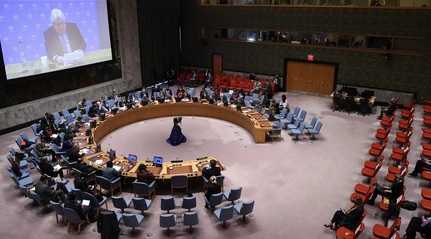
31 August 2022; MEMO: Turkiye's Communications Directorate on Tuesday organised a panel on reform in the UN Security Council in Cape Town, Anadolu News Agency reports.
Moderated by Turkish scholar, Mursel Bayram, the panel brought together Turkish Professor, Suay Nilhan Acikalin, South African economist, William Gumede and Daryl Swanepoel, head of the South Africa-based civil society group, Inclusive Society Institute.
The panel kicked off with a video message from Turkiye's Communications Director, Fahrettin Altun.
Altun said the UN has made significant contributions to peace and stability in various geographies of the world since its establishment.
However, he said the UN Security Council needs reform.
The UN has found itself in desperate straits in the face of recent human tragedies and wars, Altun said.
Zaheer Laher, the acting Chief Director of the UN Peace and Security's Department of International Relations and Cooperation (DIRCO), also attended the panel via video-conference and said Turkiye and South Africa have a similar approach on UN reform.
"As South Africa, we attach great importance to the development of peace and security, human rights, democracy, justice and the rule of international law in the international arena," Laher added.
Noting that a significant part of the Security Council agendas included the conflicts in Africa, Laher also said that the continent is represented by only temporary members in the Council.
"Africa and Latin America should be represented permanently in the UN Security Council," he said.
For his part, Gumede drew attention to the inequality of the current global system dominated by industrialised countries. "We can say that some countries are more equal in the rule of law in this system," he said.
"In this moment of great uncertainty in an evolving world, we need change in the global system," he added.
Swanepoel stressed it is impossible for the UN to remain unaffected by the geopolitical and economic transformations experienced in the last 77 years.
He argued that if the UN wants to be inclusive, it must do so not only in terms of geographical membership, but also in terms of geopolitical orientation and cultural influence.
"There is a worldwide perception that this organisation is not doing enough to suppress and resolve conflicts. In fact, the UN is paralyzed by the interests of its competing members," he added.
Also speaking at the panel, Turkish academic, Acikalin, said the Security Council could not meet the expectations of the international system in this chaotic environment.
She stressed the "need to produce solutions with systems that cover the whole of the world and the international community and that work effectively."




